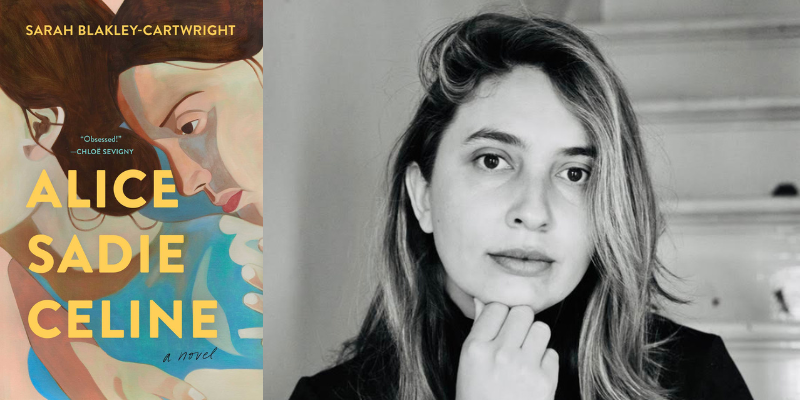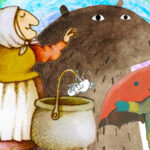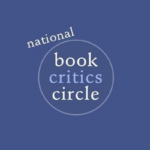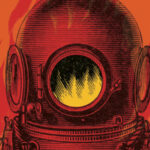Sarah Blakley-Cartwright On How Should a Mother Behave
In Conversation with Maris Kreizman on The Maris Review Podcast
This week on The Maris Review, Sarah Blakley-Cartwright joins Maris Kreizman to discuss Alice Sadie Celine, out now from Simon & Schuster.
Subscribe and download the episode, wherever you get your podcasts.
*
from the episode:
Maris Kreizman: I want to start with Celine because she’s just so fun. She had Sadie at a very young age, and then soon after, she had a great awakening, let’s say, and became a feminist of the early aughts. I want to hear about developing both her character and developing her authorial tone.
Sarah Blakley-Cartwright: Yes. So Celine. I like to call her a female chauvinist, which we don’t see all that often in literature. She’s a person of, uh, moderate appetites. I feel like she really uses feminism to justify her narcissism. Her activism is sort of partial, it’s mostly in service to herself, she’s waving the Celine flag. I think there was second wave feminism and then, you know, riot grrrl kind of third wave feminism, which to be reductive about it, focused on vagina-centered topics: you know, orgasm and birth and rape.
We’ve seen that kind of feminism fall under scrutiny for failing to account for the myriad differences among women. And for me, writing Celine as a character, that’s something that she is eminently guilty of as a narcissist. She collapses her experience with everyone else’s. If she’s feeling something, everyone else must be feeling it as well. If she thinks something, it must be true. I think what I was trying to write is how and to what degrees we’re willing to allow women to live for themselves.
And for me, that’s the question at the heart of feminism, you know, fifth wave or eighth wave. I wanted to explore the boundaries that we set around other women’s freedom. Even, or especially within, families. I think that male perpetrated sexism is well established, ever present, everywhere you look, but in fact, I think women do often participate, knowingly or unknowingly, in a patriarchal apparatus. We place limitations on women’s freedom, even in the most progressive societies. How is a mother supposed to behave?
Does that question mean anything? Are there certain things, even in an enlightened society, that we should expect of a mother
I don’t know if you saw this, the retrospective by the artist Alice Neel, the great artist, at the Met. She does these deeply empathic portraits, representations of the people around her. The show is called People Come First, and you’re just astonished walking around the show. But then there’s a little footnote, and she’s such a great artist, and this does not detract from her greatness as an artist. It just doesn’t. However, here’s a footnote that says she left her daughter down in Cuba with the daughter’s father, and the daughter tried to reach her many times and finally died of suicide, not having spoken to her mother in 30 years.
And the progressive way to think about this is, she had to go, she had to live her life. We hold women to impossible standards. Men have done this throughout history. It was what she needed to do to leave us her masterworks. And all of that is true. And yet maybe even in the most broad minded society we could ask whether we should have expectations of mothers, that they show up, that they don’t do damage, do no harm. Nut then again, I’m a new mother. Every mother does harm, you know? What is expected of me as a mother? I’d really love to know, and I don’t have answers, and that’s why I’m a novelist.
MK: Yeah, the entire question feels like the debate over the term art monster [from Jenny Offill’s 2014 novel, Dept of Speculation].
SBC: Yes, art monsters! I love that book so much. It is about who gets to be free.
MK: We should also talk about setting because this book takes place near Berkeley and built into that world is so much radical politics and so much activism.
SBC: I think if you give a novelist a utopia, they’re gonna want to poke a hole in it. You know? I think that was something that I wanted to explore.I s it quite as wonderful a snow globe as it seems to be from the outside? There’s such a great history of activism there. I’m poking fun at it a little bit, but I really love it there. And I think it is a utopia, so that’s not to diminish it.
MK: I feel like maybe Berkeley is going through a similar thing that Celine, the character, is, in having to acknowledge that many of the things that were fought for are now taken for granted.
SBC: Yes, especially with reproductive freedoms being under such threat. I think that something important for me in writing the book was to explore the obvious: that a sexual body is nothing to be ashamed of. I think on the topic of sex, I think it’s an important topic in the book and not just as an embellishment. I think for the characters, the daughter is trying to work through her mother’s sexuality to get to her own; she feels fundamentally disconnected from her body.
I have a baby daughter now. Oddly enough, it feels more important to me than ever to see women enjoying their bodies on the page. Not that I want her to read my book and have to go through what poor Sadie went through with her mother, God forbid. But I didn’t want to build to the sex scene and fade to black and then pick back up afterward, dot, dot, dot.
*
Recommended Reading:
Sorrows of Others by Ada Zhang • January by Sara Gallardo
__________________________________
Sarah Blakley-Cartwright is the author of Red Riding Hood, a #1 New York Times bestseller published worldwide in 38 editions and fifteen languages. She is the editor of Hauser & Wirth’s The Artist’s Library for Ursula magazine. She is publishing director of the Chicago Review of Books, and associate editor of A Public Space. Her first novel for an adult audience is called Alice Sadie Celine.




















